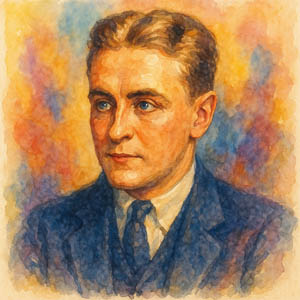~ F. Scott Fitzgerald
 Born on this day in St. Paul, Minnesota, literary icon F. Scott Fitzgerald (1896–1940) left a legacy of beauty and sorrow. He named the Jazz Age, capturing its glamour and disillusionment in writing that was unforgettable.
Born on this day in St. Paul, Minnesota, literary icon F. Scott Fitzgerald (1896–1940) left a legacy of beauty and sorrow. He named the Jazz Age, capturing its glamour and disillusionment in writing that was unforgettable.
And yet, when Fitzgerald died of a heart attack at just 44, he believed he had failed. Today, he is one of the most celebrated voices in American fiction. The New York Times eulogized him as the one who “epitomized all the sad young men of the post-war generation.”
He wrote, “An author ought to write for the youth of his generation, the critics of the next, and the schoolmasters of ever afterward.” His work, translated into 35 languages, still sells half a million copies every year.
“Show me a hero and I will write you a tragedy,” he declared. His masterpieces The Great Gatsby (1925) and Tender Is the Night (1934) captured wealth and longing with unmatched lyrical precision.
His stardom began with This Side of Paradise (1920), which mirrored his romance with Zelda Sayre, a Southern beauty who became his muse...and his undoing. “I fell in love with her courage, her sincerity, and her flaming self-respect… I love her and that's the beginning of everything.”
In Paris, he became close to Ernest Hemingway. But as Zelda battled madness and money faded, Fitzgerald wrote with haunted brilliance about love, failure, and the unreachable dream.
“There never was a good biography of a good novelist,” he noted in his Notebook. “There couldn't be. He is too many people if he's any good.”
“Fitzgerald was a hero with flaws,” wrote biographer Matthew J. Bruccoli. “He wrote brilliant stories while burdened by troubles—many of his own making. He was honorable and generous. His words endure.”
 What is in your mind? ✍️
What is in your mind? ✍️
